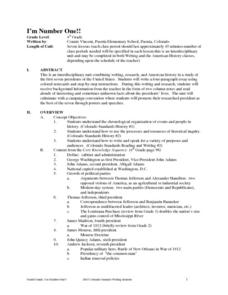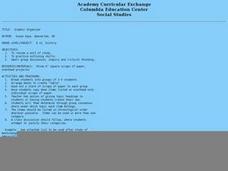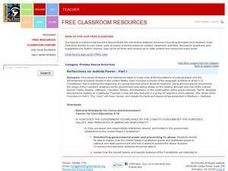Curated OER
How the Court Became Supreme
Students investigate how the Supreme Court changed under the leadership of John Marshall. In this Supreme Court activity, students recognize the role of the Supreme Court as well as the significance of Marbury v. Madison. Students also...
Friends of Fort McHenry
Was the War of 1812 Our Second War of Independence?
Though it occurred almost 40 years later, could the United States have been fighting for their independence again in the War of 1812? Using appropriate primary source material from each of the two wars, compare and contrast the situation...
Curated OER
Bill of Rights
Students research, list, define and discuss all the aspects to the United States Bill of Rights. They assess their foundations by James Madison and Thomas Jefferson and reflect on all the conditions happening at the time period of...
Curated OER
The Life of Dolley Madison
Students research the life of Dolley Madison through selected website pages. They read a timeline, letters and background information and view images. They choose 10 events from her life and fill in a chart.
Curated OER
Signed, Sealed and Delivered: Marbury v. Madison and an Independent Judiciary
Students research the judiciary branch of government, the way in which judges are appointed and the apparent loopholes and remedies in the legal process.
Curated OER
Congress and the Creation of the Bill of Rights
Students participate in inquiry activities to explore powers outlined in the Bill of Rights. In this Bill of Rights lesson plan, students creation of a class Bill of Rights, evaluate and propose amendments, and analyze primary source...
Curated OER
Get to Know Your Bill of Rights
Sixth graders research and examine the first ten amendments to the Constitution of the United States of America. They sequence events significant to this time period, read and discuss text, and in small groups prepare and present the...
Curated OER
VS.6a
Sixth graders explore, discuss and explain why George Washington is called the "Father of our Country" and James Madison is called the "Father of the Constitution." They view and create a graphic organizer after discussing a variety of...
Curated OER
I'm Number One!
Fourth graders complete a unit of lessons on the first seven presidents of the U.S. They conduct research, write a four-paragraph essay, and create posters and speeches for a simulated campaign convention.
Curated OER
TURNING POINT IN HISTORY:The War of 1812
Young scholars act as investigative reporters and research battles or events of the War of 1812. They write an original article, which may include a map, drawing, or illustration.
Curated OER
African American Education in Virginia During the Jim Crow Era
Students read and analyze a letter writtine by Dolley Madison. They evaluate a cartoon. They evaluate portraits of Dolley and James Madison. They create an earlier version of the original letter based on the information they have gathered.
Curated OER
Why a Bill of Rights? What Impact Does it Have?
Students explore the Bill of Rights. In this Bill of Rights lesson, students compare the Federalist view of government to the Anti-Federalist view of government. Students consider the impact of the bill of rights as they take notes on...
Curated OER
Graphic Organizing: Early American History
In collaborative groups, young US historians sort cards (each labeled with a single early American event or issue) according to which of the first four presidents was leading the country at the time. Learners copy the events onto a...
Curated OER
African American Women Trailblazers
Students take a closer look at the accomplishments of African-American women. In this African-American history lesson plan, students explore the work of Bessie Coleman, Gwendolyn Bennett, Lulu Madison White, and Zelma Watson George as...
National Endowment for the Humanities
Creating the Office of the Presidency
The United States needed an executive power, but it wanted to avoid a monarchy. Using James Madison's notes on the Constitutional Convention, young historians look at the juggling act the Founding Fathers did to create a role for the...
Curated OER
History of Supreme Court
Students study the role of the U.S. Supreme Court in U.S. history. They explore current events about the U.S. Constitution and discuss the Marbury v. Madison case from 1803. They identify the term "judicial review" and judicial...
Curated OER
Reflections on Judicial Power - Part I
Students research the Constitutional provision for the Judicial branch of government. They examine different U.S. founder's positions on the relative strength of the judicial branch and act as a review court for Marbury vs. Madison.
Curated OER
Interview With the Signers of the Constitution
Students work in small groups to develop three questions that a newspaper reporter assigned to cover the signing of the Constitution might have asked each of the following signers of the Constitution: George Washington, Benjamin...
Curated OER
U.s. Constitution Roll Call Test
Students act as newspaper reporters from 1787 and interview some of the signers of the Constitution. They study the contributions of these Founding Fathers: Washington, Franklin, Madison, Hamilton and discuss the purpose of the U.S....
Curated OER
Roots of Religious Liberty
Students examine the First Amendment and consider the contributions of James Madison and Thomas Jefferson. They review conflicts between the rights of Church and State and write a Madisonian argument on the issue.
Curated OER
The Federalist Papers
Students identify the Articles of Confederation and explain why it failed. They explain the argument over the need for a bill of rights in the Constitution and James Madison's role in securing its adoption by first Congress. Finally,...
Curated OER
Roles of Individuals and Groups in Politics
Students review the Federalist Paper by James Madison. They discuss the influence of interest groups in contemporary politics.
National Endowment for the Humanities
Ratifying the Constitution
Ratifying the Constitution was no simple task. Using primary sources, such as classic writings from the Federalists and Anti-Federalists, young scholars examine the arguments for and against the Constitution. They then decide: Would they...
K20 LEARN
Analyzing Early American Figures: Analyzing History
Who were they? High school freshmen brush up on their research skills by investigating an important person in American history. They select a name, fill out a KWHL chart, and research why their person is important. Scholars then complete...
Other popular searches
- James Madison
- Marbury v. Madison
- Marbury v Madison
- Marbury vs. Madison
- Dolley Madison
- President Madison
- Dolly Madison
- James Madison Bio Poem
- James Madison Federalist 10
- James Madison Presidency
- James Madison President
- Marbury vs Madison

























